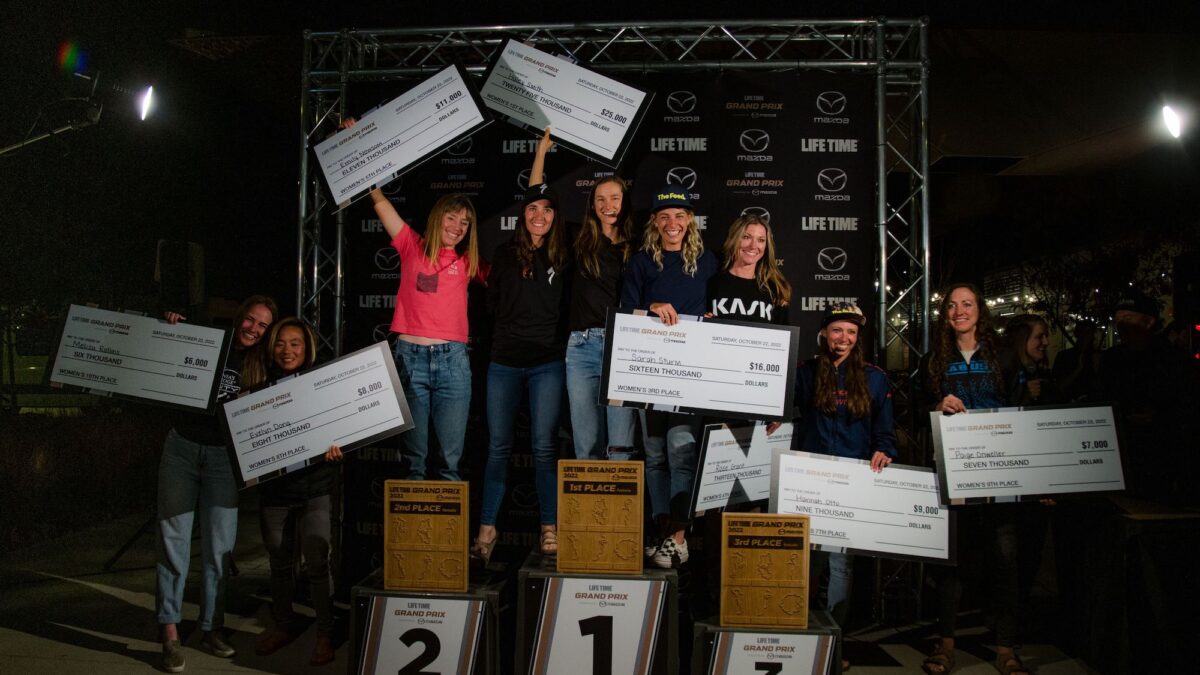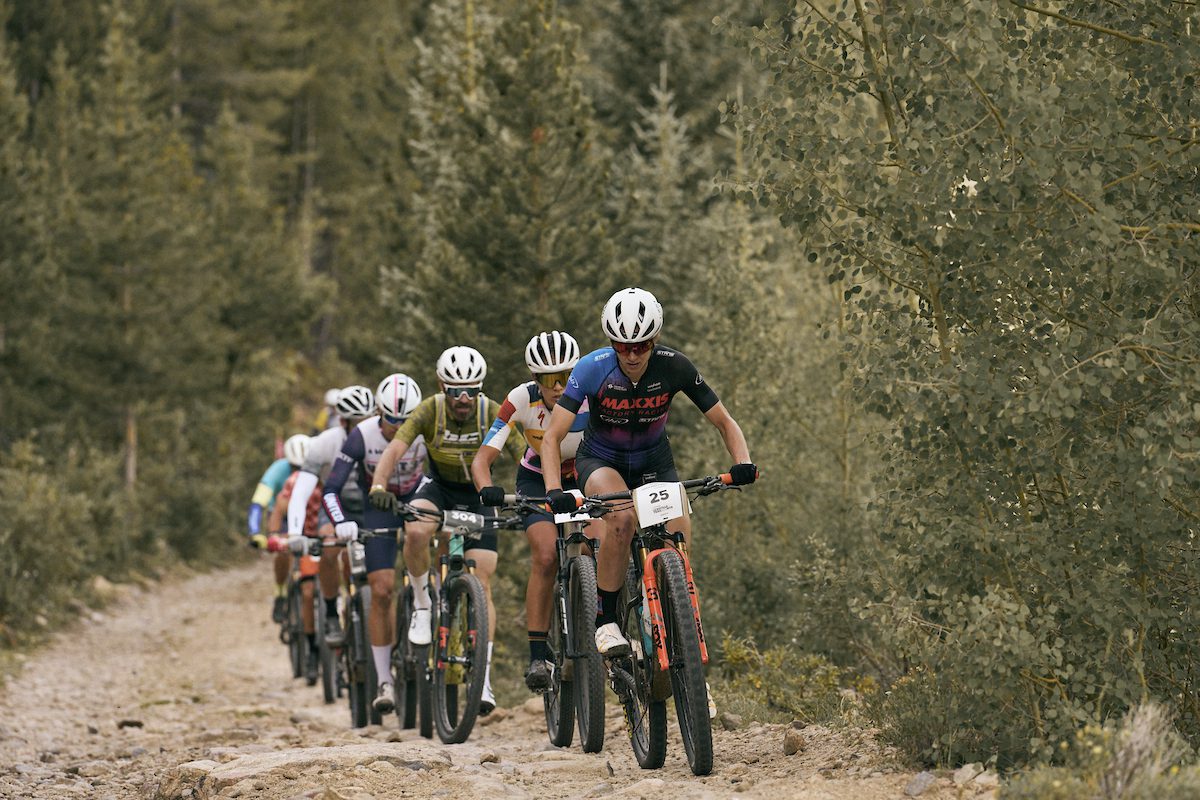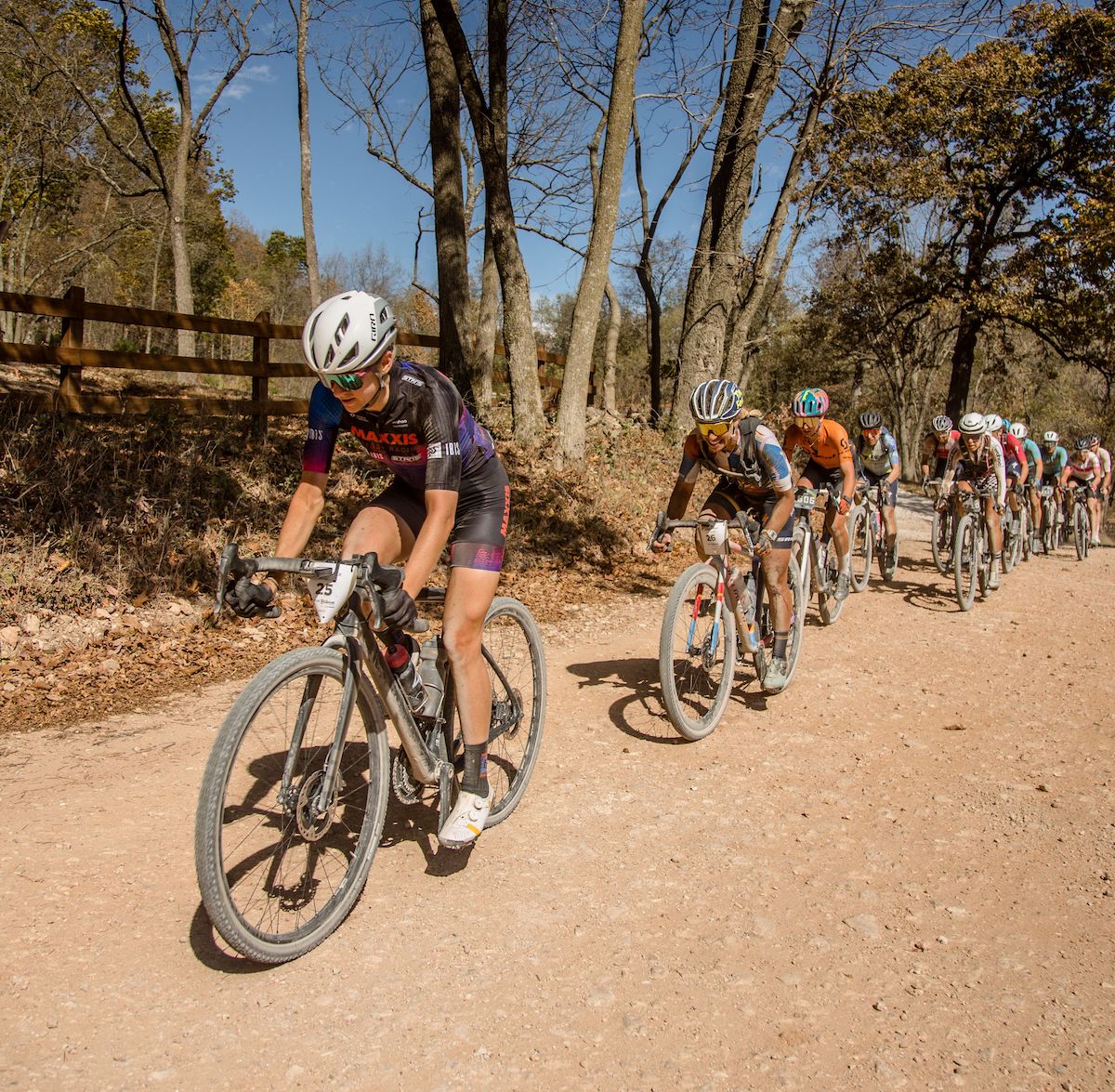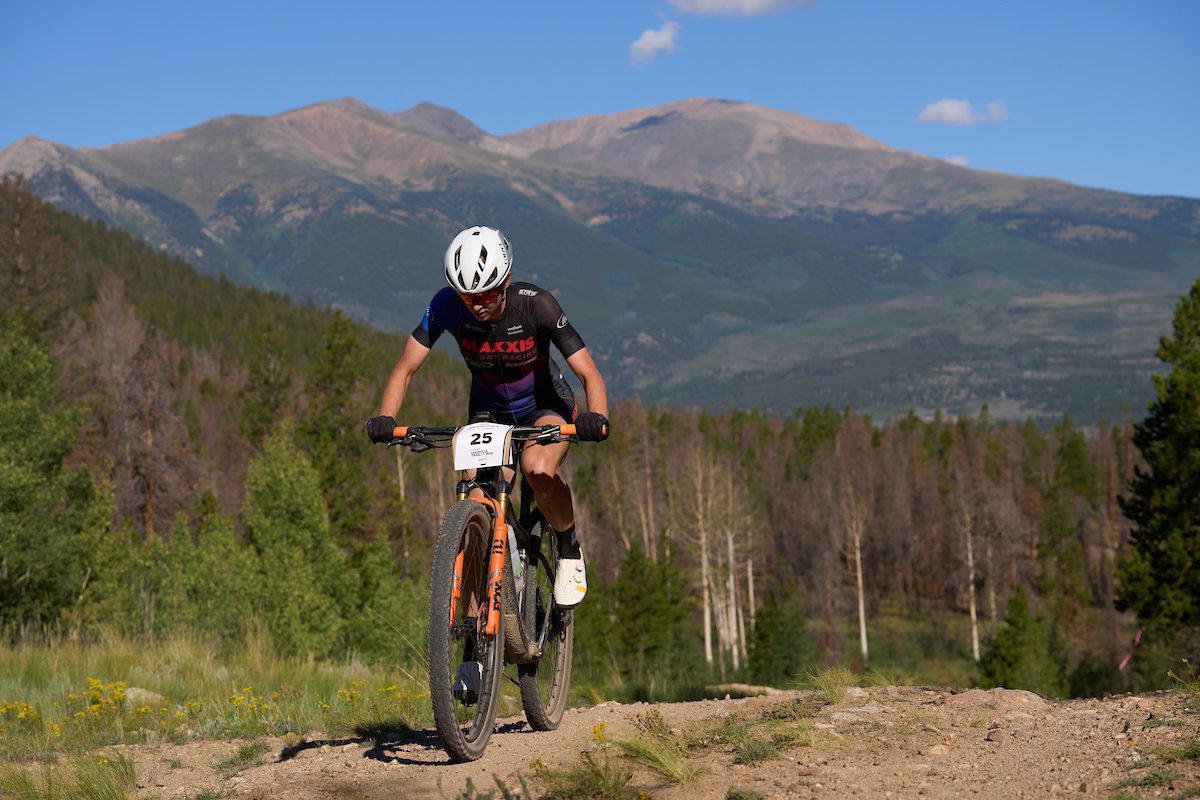Haley Smith finds consistency (amid chaotic mass starts) on road to Life Time Grand Prix victory
Canadian Olympian mixes mountain and gravel to win series' $25,000 title
 Photo by:
Linda Guerrette
Photo by:
Linda Guerrette
When Haley Smith finished Big Sugar Gravel on Saturday, it secured a major victory for the Canadian, even though she wasn’t at the front of the race. Her result in Bentonville, Ark. was exactly what she needed to claim the first Life Time Grand Prix championship title, fending off a challenge from Sarah Sturm and Sofia Gomez Villafane.
To earn the title, Smith had to ride into uncharted territory. The six-event Grand Prix is split evenly between cross country mountain biking and gravel events. Before her impressive result at Unbound, the Canadian had never raced gravel. Switching disciplines meant more than just getting used to a new bike. The races are longer and, unlike the separate men’s and women’s starts in mountain biking, gravel races use mass starts that cram thousands of riders together on the start line. As Smith explains, that was a little chaotic for the women racing for Life Time’s $25,000 grand prize.
I caught up with Smith over the phone in Chicago O’Hare airport while she was travelling back from Bentonville to Kingston, Ont., where she recently started graduate studies at Queens University.

When we talked after Unbound you said that was your first gravel race. Gravel events ended up being you two of your best results – unbound and a win at Crusher. Is there something about that race format that suits you well? Or was there a learning curve to those results?
There’s still a learning curve that I don’t think I’ve figured out yet. Does it suit me? I don’t know exactly, but I think one of my strengths is fatigue resistance. I’m pretty good at putting out the same type of power at hour 10 as I am at hour two, so that suits me well. Also, having mountain bike handling skills is a really big advantage.
The biggest challenge for me is still the mass starts in and amongst the men. I have trouble navigating that field of hundreds of people. It’s just chaotic.
How stressful is a mass start when you’re chasing series points and trying to keep track of people you’re competing against?
That’s actually quite stressful. That’s what I was most worried about Saturday [Big Sugar] and I didn’t quite do that successfully. I totally lost track of where everyone was.
It’s crazy because we can go so much faster when we’re in with the guys on those starts because of the drafting effect and they can put out – in an absolute sense – more power on flats than we can, typically. In that start, I hit 73 km/hr in the pack in that first 10 km on a slight downhill. That’s not something I’m used to. So when I’m trying to cognitively manage that but also figure out where the women are amongst the other thousand people, it’s really hard.
It makes the racing a lot more unpredictable because so much is outside of your control. If it were a women’s only peloton, your positioning is much more in your control. At something like this it’s not. It’s just chaos.
You rode very consistently all season, at some point moving into the lead. At what point did you start thinking about winning the series?
I didn’t ever, really. Other people started to talk about it and media started to ask me questions about it. I think I’ve gotten good at just not thinking about that kind of thing, not making it a thing. So heading into Big Sugar I knew it would be cool to win and I knew mathematically what I had to do to win but it still wasn’t my focus.

Was there any point during the race or leading into the race that you started to believe it was possible?
Yeah, once I was halfway through Big Sugar and I was actually with Sarah [Sturm] and Sofia [Gomez Villafane] I knew that unless a miracle happened and they got away and caught all the women that were up the road, it was sealed up just because of the math. So I guess I believed it then. Mid-race Saturday I realized it was probably going to happen.
After Crusher in Tushar, you posted about doubting you’d “ever win a race again.” After a stressful couple of years, including getting through RED-S, how much does taking this series title mean to you?
It’s so hard for me to answer that. I think having a consistent and solid foundation is what allows you to have really big, cool results. I’ve never really won a series before. I won the Canada Cup overall once, but I’ve never really done a series where I had a chance at winning so it’s cool to know that I can be consistent. Especially because, looking back at when I was in the depths of RED-S, I was really inconsistent. So it feels confidence-inspiring to know that I have a foundation now, a foundation of health, that allows me to be consistent. Hopefully next year I get to have a few more standout days.
On that note, I really want to thank Drew and Maxxis. They hired me after the worst year of my career. They took me on when other people probably wouldn’t have. I just have a lot of gratitude for that.
What’s on tap for next year after this win? More Life Time Grand Prix or are you returning to more World Cups?
I don’t know exactly yet. I think something similar to this year, but I’ll have to trim down the excess racing. I’m still going to pursue a small UCI calendar and World Cups and I’ll still be doing this North American mass participation stuff, but I’ll streamline it a little bit. I haven’t made any firm plans yet, other than I know I’ll be racing with Maxxis Factory and we’ll just try craft a fun season.
Life Time GP spans six and half months, from early April to late October. How do you plan to be on form over such a long period, especially when it’s not the only racing you’re doing?
To be honest, I don’t think I was ever “on form.” Because I was doing other races, I don’t think I was ever really able to peak. That’s where that consistent, solid foundation comes in. I know from the literature that you don’t necessarily want to seek peak form in the year following an Olympic build-up, so that wasn’t too much of a surprise. It was in the plan to not be on form.
I think the keys are staying healthy, staying relaxed enough that you don’t feel like you’re emotionally charged the whole year and keeping enough perspective and different stuff in your schedule that you can feel like you’re getting fresh challenges all the time instead of just getting the same thing weekend in and weekend out.
Equipment is also really important. I think it’s remarkable that I made it through that whole series without a single flat tire or mechanical. Not a lot of people can say that.
So now that you have pretty solid evidence of that consistency, and that base form, will you try to target a few more specific races next year?
I think so. In the next couple weeks, we’ll get a schedule going. I would like to have a couple of peaks in the year. Something early season and something late season. It’s really fun to feel peaked, to feel fast, that’s a really cool feeling.
Life Time made a big deal of offering big prize purses and $25,000 is a solid chunk of cash. How important is that element of the win to you, as you keep moving forward in your career? How important is having events with solid cash prizing to racing, more generally?
It’s pretty big. We don’t make a ton of money as professional off-road racers. We don’t have a pension, we don’t have health care. You make financial sacrifices in order to do this. So having prize purses is incredible. That’s where a large portion of your income comes from. It feels so adult but with the Bank of Canada mortgage rate increase and moving into my first home this year it is kind of stressful. So knowing that there’s an opportunity to earn some extra money is really motivating.

One other benefit that I think Rob Britton pointed out to me is that by getting into the series, you get to do a bunch of pretty iconic races that can be hard to get into, sometimes even for pros. Was there any event that you were really looking forward to? Or one that really surprised you?
I had been thinking about Leadville 100 for a long time because I had known about it for a long time. Funnily, it was the one that crushed me the most. It was the hardest one and the one I’m most traumatized by. Doing these kinds of events, they’re bucket list things, they’re really fun, they’re incredible adventures and I never would have been able to do them without this series because I never would have been able to focus on doing them.
Honestly, I’m very surprised that I enjoyed Unbound. I remember L’Espy had a deferred entry to it for the last few years, from before the pandemic. I vividly remember telling him “Why do you want to do that? That is so dumb, that is so long. Why would you ever subject yourself to that?” And then I ended up loving it.
Are there any lessons from doing these races for the first time that you can take into next year?
Oh, so many of them. I couldn’t distill that all into one conversation. But I think optimism is probably the biggest one. You have to stay optimistic the whole race because things can change in the last 10 minutes of a 12-hour effort. Which feels like a metaphor for life, I guess.
The other lesson is that you’re capable of a lot more than you think you are. You can always give more than you think you can and, when you think you’re done, you’re probably only 50 per cent of the way to collapse. So I think it teaches you a lot about your strengths and your capacities.
You’ve started school again this fall. What led to that decision, and how does it fit into racing?
I knew it was time for me to go back to school. I’d always wanted to. I actually think that going back to school is going to make me faster, because it’s making me feel more whole, more fulfilled. You also have a lot of free time as a bike racer, and grad school is typically quite flexible. So far, it’s been working out really well with my schedule and I anticipate that it will continue to do so.
The reason behind it was that it’s a passion of mine. It’s something I’ve always wanted to pursue. After the Olympics, when I was really disillusioned with this sport and my future in it, I knew it was the right time to go back. Funnily enough, it’s made me more excited about bike racing.
